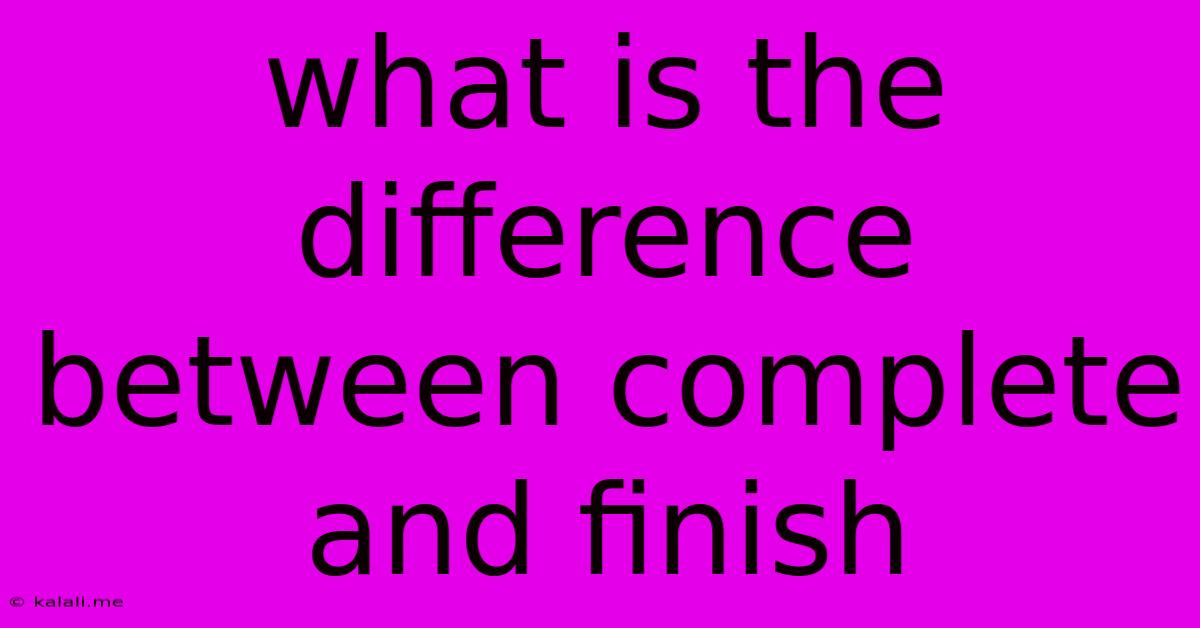What Is The Difference Between Complete And Finish
Kalali
May 21, 2025 · 3 min read

Table of Contents
What's the Difference Between "Complete" and "Finish"? A Deep Dive into Subtle Nuances
Choosing between "complete" and "finish" can feel tricky, even for native English speakers. While often used interchangeably, these words possess subtle yet significant differences in meaning and connotation. This article will delve into those nuances, providing clear examples to help you choose the right word for your context. Understanding this distinction will significantly enhance your writing precision and overall clarity.
Meta Description: Learn the subtle but crucial differences between "complete" and "finish," improving your writing accuracy and understanding of these often-confused words. We provide clear examples and explanations to help you master their usage.
"Complete" and "finish" both indicate the end of a process or task, but their focus differs. "Complete" emphasizes the entirety and thoroughness of the task, suggesting all parts are present and accounted for. "Finish" emphasizes the act of concluding the task, often implying a sense of finality and potentially a sense of urgency or speed.
Let's examine these differences through various contexts:
Differences in Connotation and Usage
-
Complete: This word suggests comprehensiveness and wholeness. Think of completing a set, a collection, or a project where every element is crucial. For example:
- "I have completed my PhD dissertation." (This implies the dissertation is fully written, edited, and submitted).
- "The construction crew completed the building on schedule." (All aspects of construction are done).
- "She completed the marathon despite the challenging weather." (The entire race was run).
-
Finish: This word focuses on the act of bringing something to an end. It emphasizes the cessation of activity rather than the thoroughness of the result. Examples include:
- "I need to finish this report by 5 PM." (Focus is on the deadline, not necessarily the perfection of the report).
- "He quickly finished his meal." (The act of eating is concluded, not necessarily the quality of the food).
- "Let's finish this conversation later." (The act of talking will end, the resolution of the topic is not implied).
Grammatical Considerations
Both words can function as verbs and adjectives, but their usage as adjectives differs slightly. "Complete" is often used to describe something that is whole and undivided, while "finished" often describes something that is ready or prepared.
- Complete set of encyclopedias (All volumes are present)
- A finished product (Ready for sale or use)
Choosing the Right Word
The best way to choose between "complete" and "finish" is to consider your intended emphasis. If you want to highlight the thoroughness and comprehensiveness of the task, use "complete." If you want to emphasize the act of concluding the task, use "finish."
Consider these examples:
- Incorrect: "I finished my homework perfectly." (While grammatically correct, "completed" better emphasizes the thoroughness)
- Correct: "I completed my homework perfectly." (Clearly communicates the high quality and thoroughness).
- Incorrect: "He completed the race quickly." (While grammatically correct, "finished" better emphasizes the speed of completion)
- Correct: "He finished the race quickly." (Focus is on the swiftness of completion).
By understanding these subtle but significant differences, you can significantly improve the precision and clarity of your writing, choosing the word that best conveys your intended meaning. Mastering this distinction will make your writing more effective and impactful.
Latest Posts
Latest Posts
-
Do You Have To Primer A Wall Before Painting
May 21, 2025
-
How Do You Get Tar Out Of Clothes
May 21, 2025
-
Ratio Of Cement Sand And Concrete
May 21, 2025
-
Can You Use An Induction Pan On A Gas Stove
May 21, 2025
-
How Do You Feed A Horse In Minecraft
May 21, 2025
Related Post
Thank you for visiting our website which covers about What Is The Difference Between Complete And Finish . We hope the information provided has been useful to you. Feel free to contact us if you have any questions or need further assistance. See you next time and don't miss to bookmark.